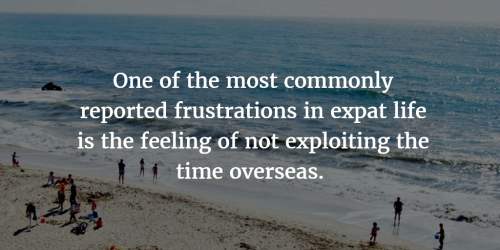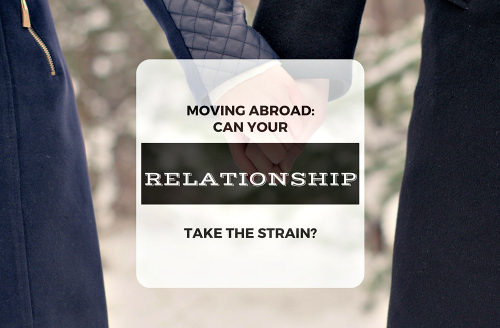You may have been together for years, brought up a family and consider each other to be best friends and closest allies. So you might believe that together you can conquer anything that life can throw at you.
Whether you and your partner are married, engaged, a long-term couple or newly-met, if you are thinking of moving overseas together, your relationship will be forever altered.It’s a massive commitment to strike out together and establish an entirely new life. For many couples the cooperation needed to pull off such a complex and stressful change can revitalise their relationship, bringing them closer together and forging an even stronger alliance.
For others, the move drives a wedge between them, permanently destroying the passion that held them together. The stress of starting again, the loneliness of separation from friends, and jealousy as one partner adapts faster than the other can all destroy the strongest of relationships.
Communication is important before, during and after any move overseas, especially when children are involved. Unfortunately, too many expat couples ignore their problems and attempt to battle on, leaving small issues to snowball into crises.
It’s all too easy for couples to struggle on in silence, letting the little things pile up into a mountain of troubles. Whilst single expats may have loneliness to deal with, paired-up expats face double the stress, each struggling to adjust, but also dealing with the other’s issues.
Living overseas is not an automatic route to divorce, but challenges await for every expat couple. We’ve taken a look at the most common troubles that afflict relationships overseas.
Lack of communication
This applies to all relationships facing difficulty, but is even more important overseas. Small cracks in the partnership can become yawning chasms that separate you. In many cases you will both be experiencing the same problem, just in a different way.
Sometimes couples want their time abroad to work so much that they are afraid of confronting problems, getting stressed and frustrated without ever getting to the root cause.

There’s a lot to worry about when establishing a new life: money, healthcare and more. But refusing to talk about them is a quick way for each partner’s stress levels to increase and to see the other as part of the problem.
Set aside time to talk things through, seeking to find solutions rather than place blame.
Living in limbo
Some jobs will come with a definite end date, a contract that stipulates when you’ll be heading home or moving on to another posting. Whether this is measured in months or years, it means a lot.
Having even the roughest plan can do a lot for your state of mind. Living in limbo, unsure of what direction your lives may be heading in, can be a major problem.
Remember to make plans together and talk things through before making any changes. You are in this together, even if one of you is the main breadwinner.
The feeling of uncertainty is all the more acute for spouses who, due to visa restrictions, are unable to work. As we’ll discuss later, giving up a career can be a major cause of upset for expat partners.
Not having fun
When planning a new life overseas, few expats dream of hours spent on frustrating bureaucracy. Rather, they daydream of adventures in exotic locations and a glamorous high-life.
One of the most commonly reported frustrations in expat life is the feeling of not exploiting the time overseas. Just as at home, there is work to be done which starts eating into precious leisure time.
It’s easy to underestimate the number of hours you’ll spend in the office, commuting or dealing with expat paperwork. All of which will limit the time you can spend together doing the exciting things you looked forward to.

Set aside time to make the most of your experiences overseas, visit the tourist sights and try the food. Visit neighbouring countries and get off the beaten track.
Remember that your work may be demanding and you may find yourself in a culture where 9-to-5 is just the start of the working day. But also remember the sacrifices that you’ve both already made and make sure you reward yourself with enough pleasure to stay happy.
Stress
There’s a lot to think about when heading overseas. There’s plenty of practical problems to solve and a whole host of emotional baggage to carry as well.
Where one of you may be working hard on one set of problems, the other may be working just as hard on another. Then on top of all that, you’ll each be dealing with anxiety about the move and a host of ‘what if’ scenarios about things that may go wrong.
Even the most composed and organised of us is subject to stress, so show your partner some support and encourage them to talk about how they feel. You’re in this together and the best support you can get is from your other half.
Stress can manifest itself in various ways, from sleepless nights and loss of appetite to irritability and mood swings. Identify these symptoms in yourself and your partner as early as you can and head things off before they lead to disaster.
Try to manage the amount of pressure you are under. Prioritise tasks and spread the workload so you still get the chance to rest and enjoy your exciting new life.
Infidelity
Temptation exists everywhere in the world, but overseas a taste of the exotic can be irresistible. Suddenly a different set of cultural rules come into play and infidelity may be more accepted or risqué enough to be an exciting risk.
Particularly in Asia and the Middle East, where males are given more freedom to philander, a local beauty may catch an eye, steal a heart and ruin a marriage.
And it’s not just the local culture that may give expats the feeling that they can play away from home with impunity. Dr. Yvonne McNulty of University in Singapore, wrote Till Stress Do Us Part: The Causes and Consequences of Expatriate Divorce. The study looked at a range of expat divorces around the world and found several factors that contribute to breakups. When infidelity occurs, the expat community can “become almost like a toxic influence on a marriage.”
Dr. McNulty suggests that expat men feel they’ve joined a club where cheating is acceptable, “it’s like a groupthink attitude,” She told Wall Street Journal. “If one or two individuals are engaging in extramarital affairs the men tend to say, that gives me permission to do it.”

Expats may suddenly find themselves fending off flirtatious behaviour, contributing to the temptation. Wealthy westerners are a likely target for both lovelorn locals and gold digging chancers.
Any couple will deal with one partner’s misbehaviour in their own way. For most it is a make-or-break situation that either sees the couple strike out on separate paths or encourages them to talk about underlying issues and strengthen their bond.
Spending too much time together
It may seem unlikely, what with all the errands that need running, furniture to be bought and paperwork to be chased, but you may actually need to spend more time apart.
Your partner may be the only person you know in the country, so there is a temptation to stick together and confront culture shock together. This can be limiting as you only visit sights you both agree on and don’t strike up conversations with strangers.
It’s important also for you to feel independent in your new country, able to take on whatever challenges the day throws at you. If you and your partner are always within reach of each other, neither of you will develop the confidence as individuals to take on the world.
Spending all your time together also leaves you at risk of losing you individual identity. You have been removed from the friends, hobbies and cultural norms that helped define your personality, but now you are just one of a pair.

Anne Merrit, an English teacher in Asia, told matadornetwork.com how she met an American couple who rarely spent time apart. “In a Baskin Robbins in South Korea,” she writes, “I once met an American couple who were new to the country. They were teaching together, living together, and spending all their time together.”
Spending this much time together can put serious strain on even the most successful of partnerships. Set some boundaries and enjoy some of your own space.
Being a ‘trailing spouse’
It’s a curious quirk of expat life that a significant portion of overseas couple have only one partner in work. And in 90% of cases, that’s the male.
In most cases is it a term of the visa that only one of the two can work, limiting the ambitions of the other.
It may be that this works out well, giving you the chance to enjoy a career break just when you needed one. Alternatively, you may need to put a successful and fulfilling career on hold indefinitely.
At first this may seem like a nice holiday, but when boredom creeps in, swiftly followed by money worries, you may wish you could go back to work. It may also affect your self-esteem, having to rely on your working partner for financial support.
Look into your visa terms and see exactly what is prohibited. You may be able to fill the gap by working remotely for a company back home or on a self-employed basis. Failing that, look into volunteering with charities or community groups.
Loneliness
Loneliness and homesickness are common afflictions across the expat spectrum. Anywhere you arrive that is removed from family, friends and familiar language is bound to leave you rattled.
But expat couples can become insular, looking to each other to fill the void and failing to make new friends. Even together is it possible to feel lonely, needing a confidante you don’t live with.

Reach out to fellow expats, colleagues and acquaintances, and cultivate a circle of friends that you are comfortable spending time with together as well as apart.
Resentment
It’s likely that one of you is the driving force behind the move. You may be heading back to their homeland, or they may be joining you as you start a new job. Whatever the case, make sure you both get a fair deal.
If one of you thinks their sacrifices are going unrewarded or underappreciated, there is the potential for a lot of bad blood to develop.
Communication is key at all stages to make sure you both understand how each element of the move and life overseas is affecting each other.
Don’t expect a move to solve old problems
For many expats, the move abroad is an exciting chance to explore a new country and find new challenges in life. For others it’s a chance for a fresh start, escaping from troubles at home.
If this is the case, then bringing your troubles with you is counterproductive. It may be that the relationship is in trouble, for whatever reason, and a move overseas is not going to fix it.
Instead you risk being on the other side of the world, potentially facing a heart-breaking decision to leave your partner adrift overseas.
Because of this agonising dilemma, and out of a sense of loyalty, some expats struggle on. As painful as it is to stay in an unhappy relationship, some will stay together for a variety of reasons, often making the situation worse.
Before leaving, make sure that both parties are happy to make the change and are prepared to face the challenges ahead. If the relationship woes are truly a deal-breaker, make the split before leaving and the travelling partner can at least enjoy a fresh start.
This is all the more important when there are children to consider. Expats who divorce overseas can find themselves embroiled in local custody proceedings and divorce hearings which can leave one partner totally cut out.
Do you have any advice for couples moving abroad? Let us know in the comments!
Article by Andy Scofield, Expat Focus International Features Writer

